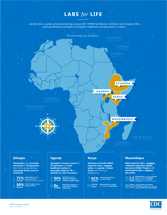Laboratory Accreditation Program to Strengthen Health Systems

On July 27, 2009, in Kigali, Rwanda, with critical support from CDC's Division of Global HIV/AIDS, 140 host government laboratory personnel, health experts and policymakers from 12 African countries launched the first-ever World Health Organization (WHO) AFRO -accreditation program for quality improvement of the continent’s medical laboratories- a program that will provide better training and expand diagnostic test capacity throughout Africa and one that WHO AFRO and CDC believe will be a historic step to strengthen health systems and lead to better care for patients.
Laboratories in Africa Challenged with Limited Resources and Equipment
Laboratories form the backbone of health systems, providing health care workers with critical test results for numerous deadly diseases, yet in Sub-Saharan Africa, which carries a huge disease burden, laboratories are among the most ill-equipped and poorly resourced facilities anywhere.
Only a few of Africa’s laboratories now are accredited but under the guidance of CDC and WHO-AFRO, the American Society for Clinical Pathology (ASCP), the Clinical Laboratory Standards Institute (CLSI), America Society of Microbiology (ASM), the Association of Public Health Laboratories (APHL) and the Clinton Foundation will assign dozens of volunteer American lab professionals to help implement training programs to build local capacity and boost and standardize the quality of African laboratories for a sustainable systems.
A Five-step Accreditation Process Critical for Boosting Lab Quality
Through a five-step accreditation process, labs will be able to gradually receive credit for improvement – and eventually attain accreditation. This extra help is seen as critical to reach a consistent high standard of work.
If laboratories function properly, doctors and nurses not only will get correct diagnoses of diseases and an indication of when and how to begin treatment, but they also will know when drugs fail and people develop resistance to medications. This is critical in Africa to monitor patients infected with HIV, TB, malaria, and a host of other diseases. In addition, an efficient laboratory also can dramatically reduce waiting time to get results – allowing patients in parts of Africa who often travel a day or more for testing to receive the laboratory results sooner. Studies have shown that when patients need to return for a second visit to a hospital or clinic for test results, significant percentages fail to do so.
The meeting, which ran from July 27 to 29, 2009, had three goals: unveil a blueprint toward the path of accreditation; obtain key stakeholders’ support for accreditation; and showcase a task-based training program in support of laboratory improvement required for accreditation.
For further information on this program, contact David Cross.
Labs for Life Infographic:

Get email updates
To receive email updates about this page, enter your email address:
Contact Us:
- Centers for Disease Control and Prevention
1600 Clifton Rd
Atlanta, GA 30333 - 800-CDC-INFO
(800-232-4636)
TTY: (888) 232-6348
24 Hours/Every Day - Contact CDC-INFO
 ShareCompartir
ShareCompartir


